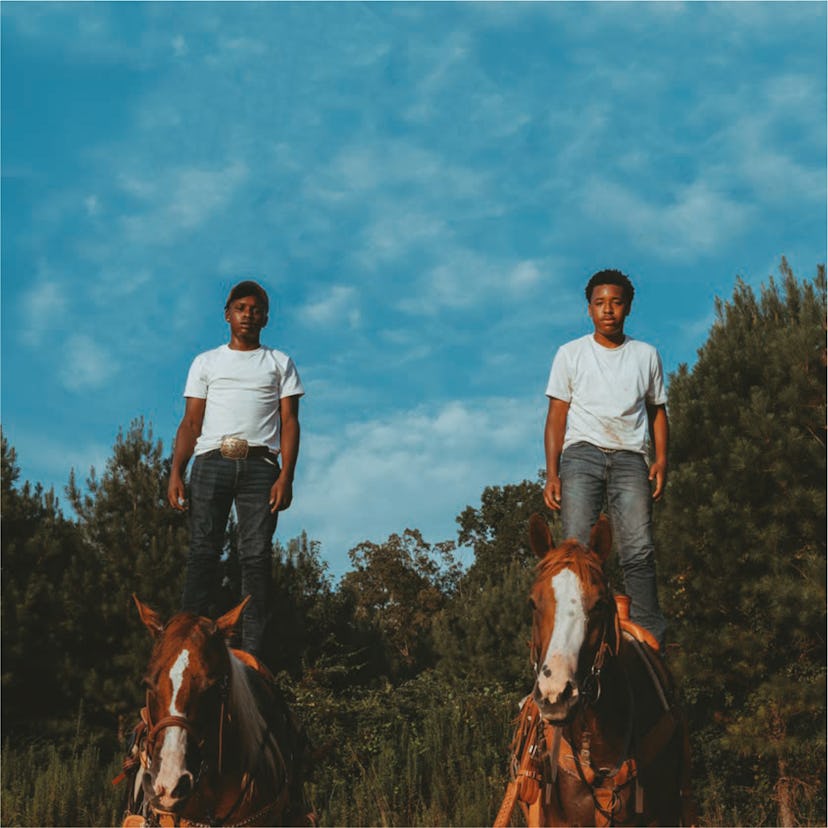Everyone has a story about a chance encounter on a night out that changed their life. For the photographer Ivan McClellan, it was when he met Charles Westley Perry at a party in 2015—where the filmmaker invited him to a Black rodeo in Okmulgee, Oklahoma.
At the time, Westley Perry was working on a documentary about Black cowboys, a culture that McClellan—a city kid from Kansas City—didn’t know much about. But what McClellan saw when he landed in Okmulgee that summer changed the trajectory of his career, and is now the focus of his first book, Eight Seconds: Black Rodeo Culture.
“It was a 105 degree day, 100 percent humidity,” the artist—who was an Oregon-based designer before pivoting to photography and has since had his work exhibited at the Buffalo Bill Center of the West and shot campaigns for Wrangler and Stetson—recalls. “There were glistening white horse trailers all around the lawn outside of the rodeo arena, and barbecue smoke everywhere. There was R&B and gospel and hip-hop music all mingling together, and everywhere I looked, there were thousands of Black cowboys: young men riding around with no shirt on and gold chains, [wearing] Jordans and basketball shorts on a horse.”
It was the kind of scene that McClellan admits he’d never come across in any western film or country music video. “But these guys were as cowboy as they come,” he says.
Dontez & Floss, Okmulgee, Oklahoma
Bull Riders, Rosenberg, Texas
As one of the earliest and few documentarians of contemporary Black rodeo culture, McClellan felt a heavy responsibility to “get it right” when it came to publishing Eight Seconds, out April 30 via Damiani Books. For him, that meant ensuring viewers understood that Black rodeo culture isn’t monolithic. “I want to make sure that we have a broad idea of the culture, that there are men and women and they’re both powerful—because they both cowboy equally,” he says. “And to represent the LGBTQ people in this world, the youth and the old folks in this world...there’s a broad range of stories and lives under those cowboy hats.”
Rodeo Queen, Okmulgee, Oklahoma
Jadayia Kursh, Okmulgee, Oklahoma
The photographs in the book document communities across America, from the Country Boyz and O’city Riderz in Oklahoma to calf ropers in Las Vegas—where a crowd is captured by McClellan watching fourth-generation cowgirl and rodeo champion Kortnee Solomon throw a perfect lasso—all the way to Los Angeles, where the blunt-smoking Compton Cowboys ride.
Kortnee Solomon, Okmulgee, Oklahoma
Eight Seconds aims to celebrate Black cowboys’ history as well as to reclaim it. “White folks were cowboy-ing, white folks were doing country music, but Black folks were doing it too,” McClellan says. “For me, it’s not about taking something away or changing something narratively. It’s about saying yes, John Wayne and Bass Reeves and Bill Pickett and the Vaqueros and native stories. You can’t tell the story of the West without telling it all.”
Patrick Liddell, Las Vegas, Nevada
Raemia Clemons, Okmulgee, Oklahoma
As luck would have it, McClellan’s book is releasing around the same time of Beyoncé’s Cowboy Carter album rollout; the pop icon is making history by going country and, in the process, reviving interest in Black country music and western aesthetics. “It’s great for all of the country singers like Reyna Roberts or Madeline Edwards or Mickey Guyton who have been trying to burst through the country ceiling for years as Black women,” McClellan says. “For Beyoncé to blaze forward and go, ‘Hey, you don’t need mainstream country radio to play you to have validity. Do your thing and do it as loud as you can and make your own platform...’ I love that she’s owning it. And I love that she called it Cowboy Carter: she’s making it a gender-neutral term, and regardless of the history, she’s taking ownership of it and putting her marker on it.”
“I can’t wait to hear it at rodeos this summer,” McClellan continues. “I know the cowboy community is going to fully embrace it. They’ve already been riding with Beyoncé for years.”
